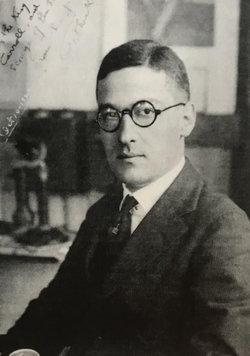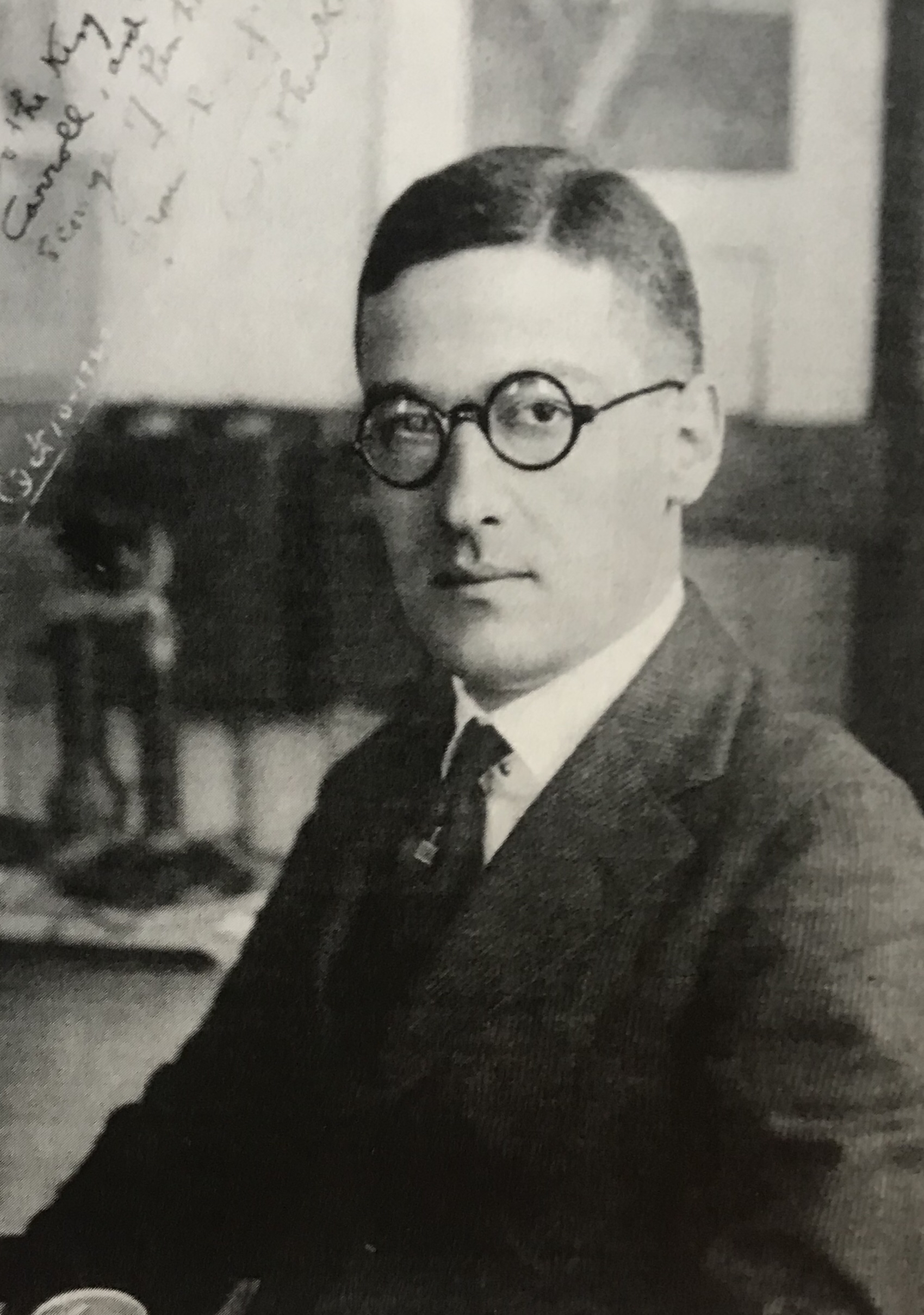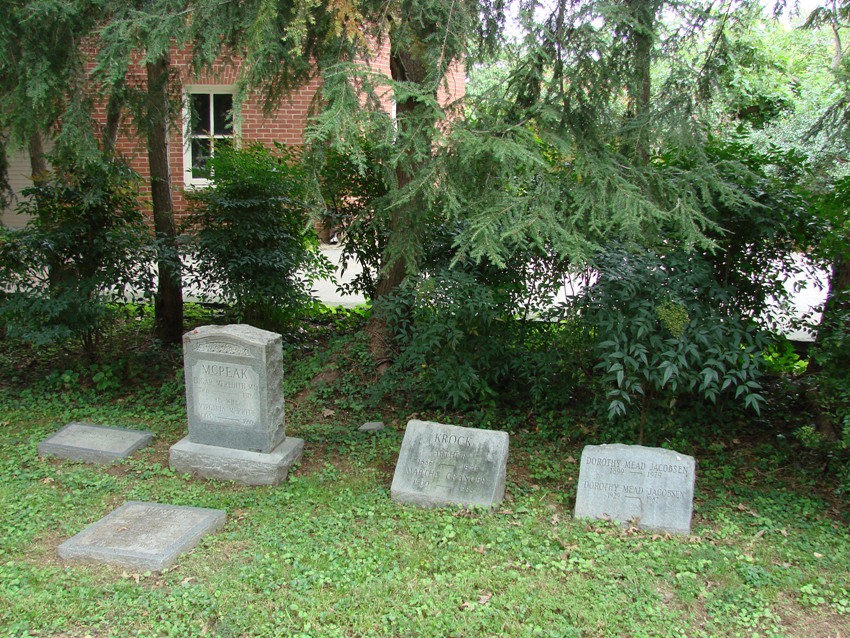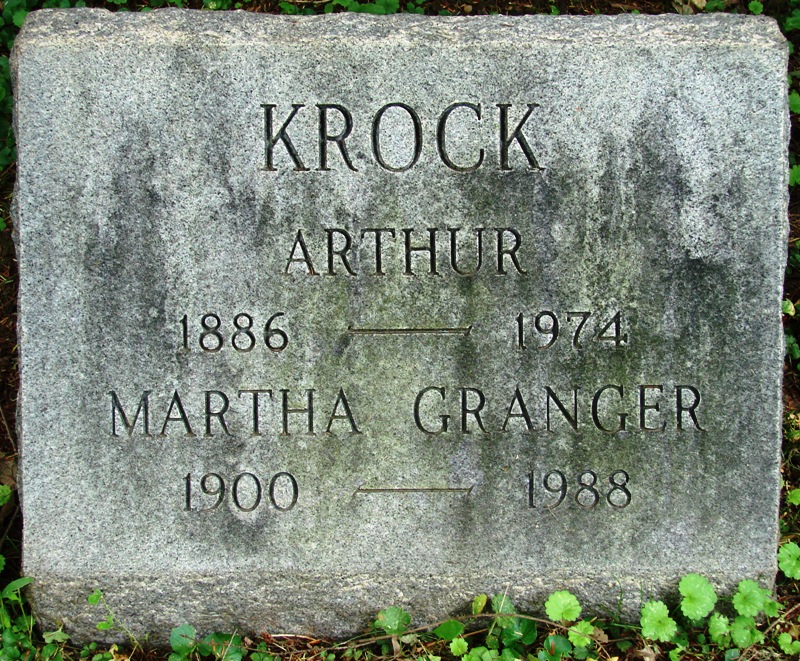Pulitzer Prize Recipient Author. He was an American journalist who received the Pulitzer Prize three times during his over sixty-year career. As a newspaper reporter, he was sometimes referred to as the "Dean of Washington newsmen" and is remembered for his "New York Times" newspaper column "In the Nation," which was noted for its opinions on public policy. Born Arthur Bernard Krock, the son of a German-Jewish bookkeeper, he was raised by his maternal grandparents until age six, when his mother became blind following his birth. When his mother regained her sight, he joined his parents in Chicago, Illinois, where he graduated from high school in 1904. He attended Princeton University in Princeton, New Jersey, but dropped out in his freshman year due to financial issues and returned to Chicago, where he graduated with an Associate's Degree from Lewis Institute. In 1907, he began his journalism career with the "Louisville Herald," then went to Washington DC in 1911 as a correspondent for the "Louisville Times" and "Louisville Courier-Journal". Four years later, he returned to Louisville as editorial manager of the jointly owned papers. In 1919, he covered the Paris Peace Conference and was awarded a French citation. In 1923, he moved to New York City, New York, and worked briefly for the movie industry's newly established lobbying body before becoming an assistant to Ralph Pulitzer, the publisher of the "New York World," and subsequently also becoming an editorial writer. In 1927, he joined "The New York Times" and, in 1932, became its Washington correspondent and bureau chief. He ran it until he stepped down in 1953, although he did not retire until 1966. During his 60-year career, he received the Pulitzer Prize in 1935 for his Washington dispatches, the Pulitzer Prize in 1938 for his February 27, 1937, exclusive interview with President Franklin D. Roosevelt, and the 1951 Pulitzer Prize Special Citation for his exclusive interview with President Harry Truman. After he retired, he published a collection of his columns "In the Nation: 1932-1966" in 1966, his memoirs "Sixty Years on the Firing Line" in 1968, and "Intimate Recollections of Twelve American Presidents from Theodore Roosevelt to Richard Nixon" in 1970, "The Consent of the Governed, and Other Conceits" in 1971, and "Myself When Young: Growing Up in the 1890s" in 1972. In April 1970, he was presented with the Presidential Medal of Freedom by President Richard M. Nixon. He died at the age of 87. His papers reside in the Seeley G. Mudd Manuscript Library at Princeton University.
Pulitzer Prize Recipient Author. He was an American journalist who received the Pulitzer Prize three times during his over sixty-year career. As a newspaper reporter, he was sometimes referred to as the "Dean of Washington newsmen" and is remembered for his "New York Times" newspaper column "In the Nation," which was noted for its opinions on public policy. Born Arthur Bernard Krock, the son of a German-Jewish bookkeeper, he was raised by his maternal grandparents until age six, when his mother became blind following his birth. When his mother regained her sight, he joined his parents in Chicago, Illinois, where he graduated from high school in 1904. He attended Princeton University in Princeton, New Jersey, but dropped out in his freshman year due to financial issues and returned to Chicago, where he graduated with an Associate's Degree from Lewis Institute. In 1907, he began his journalism career with the "Louisville Herald," then went to Washington DC in 1911 as a correspondent for the "Louisville Times" and "Louisville Courier-Journal". Four years later, he returned to Louisville as editorial manager of the jointly owned papers. In 1919, he covered the Paris Peace Conference and was awarded a French citation. In 1923, he moved to New York City, New York, and worked briefly for the movie industry's newly established lobbying body before becoming an assistant to Ralph Pulitzer, the publisher of the "New York World," and subsequently also becoming an editorial writer. In 1927, he joined "The New York Times" and, in 1932, became its Washington correspondent and bureau chief. He ran it until he stepped down in 1953, although he did not retire until 1966. During his 60-year career, he received the Pulitzer Prize in 1935 for his Washington dispatches, the Pulitzer Prize in 1938 for his February 27, 1937, exclusive interview with President Franklin D. Roosevelt, and the 1951 Pulitzer Prize Special Citation for his exclusive interview with President Harry Truman. After he retired, he published a collection of his columns "In the Nation: 1932-1966" in 1966, his memoirs "Sixty Years on the Firing Line" in 1968, and "Intimate Recollections of Twelve American Presidents from Theodore Roosevelt to Richard Nixon" in 1970, "The Consent of the Governed, and Other Conceits" in 1971, and "Myself When Young: Growing Up in the 1890s" in 1972. In April 1970, he was presented with the Presidential Medal of Freedom by President Richard M. Nixon. He died at the age of 87. His papers reside in the Seeley G. Mudd Manuscript Library at Princeton University.
Bio by: Linda Davis
Family Members
Advertisement
See more Krock memorials in:
Records on Ancestry
Advertisement












